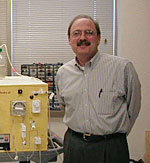By Bill Catlin
Minnesota Public Radio
May 6, 2002
Investors are turning again to medical technology, one of Minnesota's economic strengths. In 1999 and 2000, the share of venture capital dollars going to medical device companies dropped dramatically as money poured into dot-coms. Observers say the renewed enthusiasm for medical devices is good for Minnesota, but the state's lack of critical mass in biotechnology may be a looming threat.
| |
|
|
|
||
Dan Miller, head of Excorp Medical has spent the last six years finding the money and proving the technology for a bio-artificial liver. A prototype, a yellow box the size of the freezer atop a kitchen fridge, stands in the company's Oakdale offices.
"It has sharp corners and it has an atrocious shade of yellow that was not exactly what we intended. This will probably evolve to something a lot more pastel with soft corners and something a lot more cosmetically appealing down the road. But right now it's functionally effective, and we're very proud of our big yellow box," he says.
Excorp's technology uses pig liver cells to remove toxins from the blood of people in acute liver failure. It's being tested at the University of Pittsburgh. With 18 to 30 months before the device can be sold, Miller is working on raising the fourth round of investment to keep the company going. He says he's finding much more investor interest than when dot-coms were the rage.
"Today there's a resurgence in interest in medical technology, without a shadow of a doubt, largely because we're no longer being obscured by the level of investment in other areas," according to Miller.
Matt Noah, runs the Twin Cities business development and networking organizations Netsuds.com, and Medical suds and the Minnesota venture capital conference, which begins today. He says Excorp Medical's experience is typical.
"Just a couple of years ago, some of these companies were lost. They'd knock on the door and someone would say, 'Are you a dot-com?' and if they said, 'No,' the door wasn't even opened. Now it's all the rage. And it's all the rage for all the right reasons. They're good solid business plans, it's a good market and investors are looking more closely at that," according to Noah.
Minnesota's strength in medical devices helped the state rank ninth of all states in the first quarter PricewaterhouseCoopers/Venture Economics/National Venture Capital Association MoneyTree Survey of venture capital.
Jay Hare with PricewaterhouseCoopers in Minneapolis says Minnesota's strength in that sector means the state does disproportionately well when health care companies are in favor with investors. He says Minnesota may not remain among the top ten states, but the aging of the population and other broad trends will sustain interest in Minnesota medical technology firms.
| |
|
|
|
||
"There's support in this category. It's good for the economy, and even shell-shocked out-of-town investors who are looking over their portfolios are still finding good companies to invest in Minnesota, so it's something to be proud of and we should continue to work on it and try to build on it," Hare says.
But others also see signs of warning. Kris Johnson, a former Medtronic-executive-turned-venture-capitalist says Minnesota needs to participate more in the area of biotechnology to remain a major player in health care.
"There will be medical device opportunities that are related to advances in genomics and biotechnology in general. But if we don't participate in the gene based therapies and understand the diagnostic and therapeutic opportunities there, I think we at least pass up a good opportunity," says Johnson.
Longtime Twin Cities investor and entrepreneur Harlan Jacobs worries the stakes may be bigger than just passing up a good opportunity. He says treatments based on biotechnology could eclipse medical devices and with them one of Minnesota's most important economic engines.
"If the problem can be corrected by some Boston company or some California company, and they give you a shot and your heart repairs itself, and you don't need the valve and you don't need the pacemaker, folks, our economic prosperity is significantly at risk," says Jacobs.
State officials say biotechnology is on their radar screen, with a study of its potential due this summer, and efforts to promote the state at an international conference in Canada next month.


